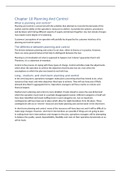Double hermeneutic: interaction between social science theory and the theories of
everyday line the double hermeneutic, where the word ‘hermeneutic’ refers to the ways in
which we interpret and understand phenomena.
What is an organization?
• An organization refers to:
o The way people work/act together (interact)
o Structure, order
o Goals, functions
• Etymology: organs in the human body
• Organization is usually defined as: coordination of people for the achievement of
some explicit purpose or common goal.
3 levels of organizations:
1. Micro: small group, classroom
2. Mezzo: school, company
3. Macro: society, European Union
Forms of organizations
• Formal/informal
• Institutionalized (example: banking systems)
• Ad hoc/temporary (come together for a brief moment and then fall apart again)
Adam Smith
Division of labour
Division of labour:
• Division of labor increases efficiency, because:
o People do not have to switch between tasks
o Skill is enhanced by repetition
o Tasks can be managed to talents è specialization
o Helps the development of specific tools/machines
• Western societies produce more wealth because there is more division of labour
• People focus on a limited task and become more efficient than people elsewhere
Why is division of labour stronger in the West?
è Because of increased liberty (=freedom) in Western societies
• Freedom to trade and barter on markets increases specialization
• Markets guide human behavior like an invisible hand
• This mechanism is more effective than central planning
Increased liberty in Western societies:
• Increasing liberty, markets, the invisible hand
• Assumption of consumers and producers as rational individuals
• Producers will focus on producing high demand (high prices) and products they can
excel in (competitive/efficient)
, Organization theorists
• Different ontological and epistemological positions
– Ontology: the nature of phenomena and their existence.
(Ontology is very much related to the existence of god. Example of an ontological
question: do you think that there is or isn’t a god?)
– Epistemology: the study of the criteria we apply to establish true knowledge. How do
we know that what we are hearing, reading, saying or writing is true?
(what is true and what is not. Example of an epistemological question: if there is a
god, what are his intentions with me?)
• Positivism and subjectivism
Scholars on organization differ in what they accept as “facts”
– Objectivists/positivists: objective facts only; observable, measurable
– Subjectivists: validity of individual experiences
• Managerialism and critical perspectives
– Managerialist: belief in the value of professional managers and of the concepts and
methods they use (example: many scholars adopt managerialist perspectives)
– Critical perspectives: (example: other scholars criticize this “managerialism” and
point at the need for other perspectives (as well)
Note that the endings “ism” and “ist” refer to belief systems and ideologies
Give two examples of the application of a modernist epistemology.
Modernists will rely on science, observation and empirical data.
Example 1: using a stopwatch to find out the quickest way to do a task
Example 2: studying human subjects to find out how much weight they can lift.
Taylor and his followers focused on improving efficiency in organizations and were using
stopwatches to find the most efficient way to perform each task.
This makes them belong to what category of organization theorists?
A. Managerialist objectivists
B. Managerialist subjectivists
C. Critical objectivists
D. Critical subjectivists
Henri Fayol
è Functions of “general” management (forecasting and planning, organizing, commanding,
coordinating and controlling). Develops organization principles managers can apply.
Karl Marx
è Focuses on inequality in industrial society and subordination of the proletariat class.
Criticizes existing political order. Predicts and calls for revolution.
Lecture 2: The modernist perspective: general principles
In from the 17th century onward, most Western societies changed from agrarian societies to
modern, industrial, capitalist societies. What was the main cause of this change?
A. Population growth
B. The invention of the steam engine
C. The reformation







